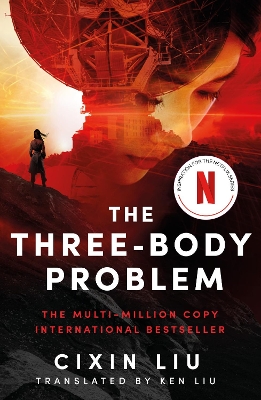A multiple award-winning science fiction book set in China and translated from Chinese? That sounds like a perfect book for me.
The book starts with the story of woman whose father is killed during the Cultural Revolution in the 1960s. She is sentenced to reeducation but eventually her training as a physicist is determined to be desirable for a new military project. She is sent to live and work on a base with a large radio antenna.
In the present day, there is a wave of murders and suicides of scientists in China. A man who is researching ways to make fabric from nanoparticles finds that whenever he takes a picture there is a clock embedded in the image. The clock is counting down. He doesn't know what is going to happen when the countdown ends. He is contacted and told to stop his research and the countdown will stop. It does.
He knew a few of the dead scientists. When visiting the husband of one he is surprised to see a set up for a video game called Three Body. The dead scientist didn't seem like the kind of person who would enjoy a game. He decides to play it to see what it is like. The game is set on a planet where day and night are not set lengths. They can't be predicted. In times of extreme cold or heat, civilizations on the planet collapse. The game then restarts in a different period of time and the goal is the same. Try to predict the movement of the sun.
People who like and are good at this game tend to be scientists and intellectuals. Once they pass a certain level they are contacted for meetups. There they are told that the world in the game is real and that aliens from that planet are on their way to Earth.
What I didn't realize when I got this book is that it is more about physics than anything else. Most of the main characters are theoretical physicists and the book is mostly them talking to each other about their research.
I'm not good with physics. I had to take a few classes in college and I hated it. Here's my hangup. When they start talking about things like, "We'll smash these particles together and if something bounces back in this direction then we'll know that there was this type of particle there." My brain says, "No you don't. You assume that what bounced your particle back was another particle because you are thinking in particles. But you can't see it. You don't know what it is. There could be a force that you don't know about that is repelling particles. For all you know, there could be a tiny elf with a mirror reflecting particles. It could be anything. You don't know!" Yeah, I'm a biology girl. I want to actually see what is going on. When this book got into discussions of what would happen if you unfold a proton in 2 or 1 or 6 dimensions ... ugh.
I had to step back from the details of this book to look at the main questions.
- Has humanity become so depraved that you would welcome an alien invasion? You don't know if they will coexist, destroy humanity, or change humanity. Do you care?
- Can you cripple a society if you make it sufficiently afraid of scientific investigation? This one is interesting to me because I read so much about anti-intellectualism in the United States. (Despite my physics rant in the paragraph above, I think investigating basic sciences is extremely important because there is so much that we don't know.)
An interesting part of the translation of this novel is the fact that so much of it is based in Chinese history and philosophy. There are some footnotes to explain the mindset of the Cultural Revolution and Chinese philosophers to English-reading audiences. There is Chinese wordplay that is explained too. I appreciated that because it helped but it is also a little embarrassing that they knew we would need the help. There are parts of the game where western historical figures are brought in. I wonder if there were footnotes in the Chinese version to explain them.
#currentlyreading #books #bookstagram #bookquotes
A photo posted by @dvmheather on Aug 26, 2015 at 6:28am PDT
This review was originally posted on Based On A True Story
